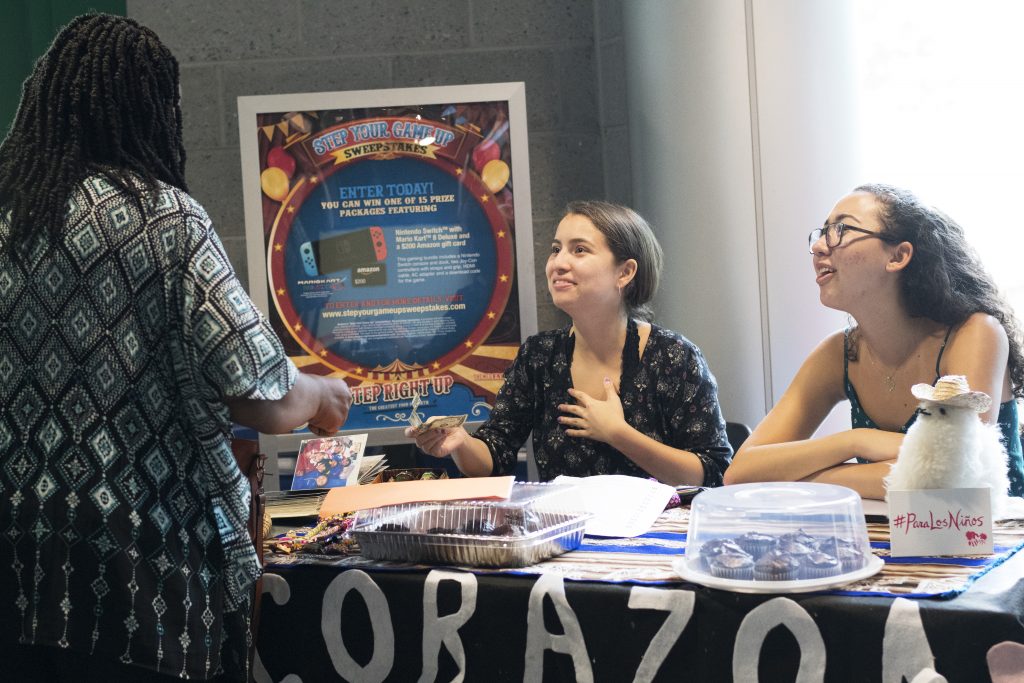Following a recent food policy change at Binghamton University, campus clubs and student groups affected have begun to react and rethink their fundraising options.
The new food policy was enacted on Aug. 1 after being drafted over the course of several months by Auxiliary Services and the Student Culinary Council. The policy stipulates that foods sold or distributed on campus must be prepackaged cannot contain any main-allergy food items, such as nuts and dairy. Foods that are not prepackaged or contain allergens must be preapproved by the University. For events where groups spends more $200 on their food, Sodexo will have the right of first refusal for catering as the University’s primary food provider.
Jahmal Ojeda, president of the Latin American Student Union and a senior majoring in political science, said the new policy will have a big impact on groups using bake sales and other food-related events to fundraise.
“We are celebrating our 50th year, and this year was pivotal for us, because we wanted to do a lot more in terms of fundraising,” Ojeda said. “I feel like this new food policy is setting us back.”
Ojeda said his most prominent concern is fundraising for student groups who have already budgeted for this year. He also noted that the policy might limit some multicultural student organizations that want to sell cultural foods that cannot be bought in stores or prepackaged.
“We already had a fundraising calendar, everything was organized throughout the summer and now the new food policy is presenting the issue of what can we do that will be culturally appropriate,’’ Ojeda said.
Alexa Macleod, president of the Juvenile Urban Multicultural Program (J.U.M.P. Nation) and a senior at BU, spoke about the changes her organization will face this semester and said fundraising is one of its biggest challenges.
“In the spring semester, we make a lot of purchases that have to be fundraised income through the Student Association,” Macleod said. “Everyone that participates in J.U.M.P. weekend gets a T-shirt, and those T-shirts have to be purchased through our fundraising. J.U.M.P. is known for our fried Oreo sales, which we sell when we table. Instead, now we are doing a raffle, which will try to supplement not being able to do these Oreo sales anymore. We are going to try to do a waiver.”
Waivers are provided for the groups who would like to get a specific item preapproved by the University. If waivers cannot be provided, Macleod’s group will likely end up reluctantly selling pre-packaged goods.
“These pre-packaged goods don’t offer incentive for people to buy them,” Macleod said. “I’m not going to buy a bag of chips on campus if I could just buy a bag of chips at the grocery store.”
According to Deanne Ellison, director of Auxiliary Services, the new policy is designed to promote food safety.
“Food safety is always our primary concern,” Ellison wrote in an email. “For groups who have traditionally relied on food sales for fundraising, I would encourage them to contact Dining Services well in advance of any event so that they can work together to ensure the success of their event. Every possible consideration, within the guidelines of the policy, will be given to student groups. Waivers will be approved as long as the policy guidelines are met within the timelines provided.”
According to Ellison, student groups should collaborate with University services to meet their needs.
“The policy ensures multicultural groups are represented in a variety of ways,” Ellison wrote. “Looking further into the policy, you will see there are guidelines for students to work collaboratively with Dining Services to involve off-campus caterers, and also to work together to prepare diverse meals in the campus’ commercial kitchens where the highest safety standards can be upheld.”
But Macleod said clubs already face financial restrictions that limit the vendors and food providers that can cater their events.
“A lot of small businesses around campus are willing to cater, but they can’t because they can’t afford to buy the materials that they need — and we can’t pay them until after it’s done,” Macleod said. “However, the SA cannot pay anyone until the job is completed. If we can no longer cater from the city, or the Syracuse or Cortland areas that do have bigger restaurants that cater to our communities, then this will affect our organizations as well as other multicultural organizations. Our budgets are usually smaller than other organizations, so catering from Sodexo isn’t really realistic.”



